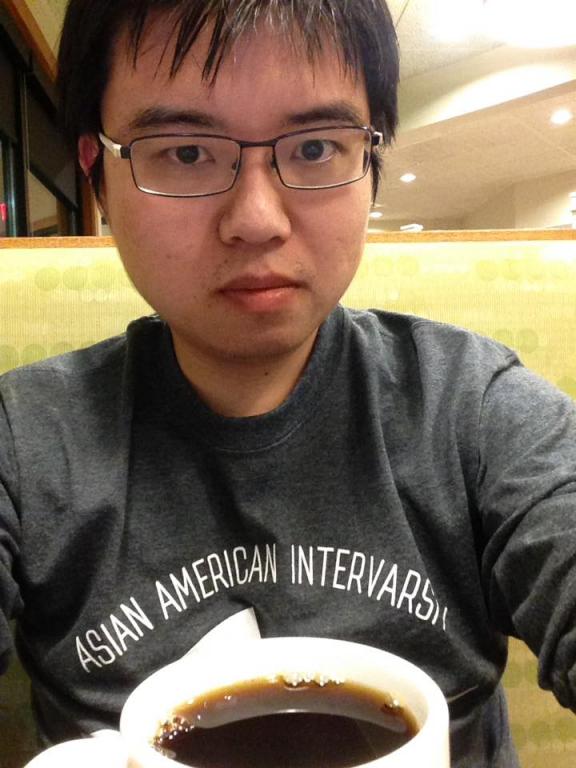
This is the second in a series reflecting on what I’ve been doing on the blog. The first is here.
I began narrating myself, as my editor on the blog Sam Rocha said I would, after I finally figured out that the point of blogging is to tell the truth. Naïvely, I had previously thought that the point of any publication was a kind of self-promotion of one’s own cleverness, a dick-measuring contest of how many intellectual balls I could possibly juggle at once in a single post while obfuscating what I was actually thinking. That was, after all, the point of my previous online writing as Chinglican and Religion Ethnicity Wired, my alter egos who alternated between commenting as a confessional Anglican and then as a dispassionate observer of religious news. Especially with Chinglican, the whole purpose was to pretend to be someone I was not – an Anglican who was Chinese and experiencing the weird bowel movements of postcolonial Anglicanism in its so-called realignment – or to pretend not to be what I actually was, which was canonically that – I had been received into the Anglican Communion on February 2, 2008 by the hand of the retired Primate of Southeast Asia on behalf of the Province of Rwanda, and I still have the papers to prove it.
It doesn’t mean that I don’t think I wrote good stuff then – I remain particularly proud of my series on why I was going to stay Anglican despite my Catholic impulses – but Sam gently informed me as my editor that it would be good for me to stop being clever and to start writing as myself. I retorted that it would probably also be a good thing for me to write for my audience, which I said didn’t expect the more radical Orthodox-in-communion-with-Rome impulses I had been developing late into my catechumenate and well into my mystagogy. He told me to write anyway, lest I be driven back into another unproductive dry spell and lose even the Patheos spot.
Around the middle of the Great Fast of that first year in 2017 (the Latins call it ‘Lent,’ and the Orthodox-not-in-communion-with-Rome compromise with them by calling it ‘Great Lent’ – which is one of those things that makes me feel weird whenever they accuse me of being in bed with Rome and not really being Orthodox), I really began to narrate myself. It started ironically, in the sense that I never wanted the blog to be about me because I had been told much earlier in my career that I should adopt a less confessional mode of writing. I did not really want to write about myself, but I was willing to discuss my experiences of liturgies and mystagogy and intellectual work. I was Eastern Catholic Person, and my bio for this blog still states that I intend to write about being Eastern Catholic, teaching Asian American studies, and being a person.
With that in mind, I began to narrate some of the myths that I had adopted that made me Catholic. I had thought that I would be narrating my journey into my first year of teaching as Asian American studies faculty at Northwestern in conjunction with my first reflections on my mystagogy. I lost my voice when Trump got elected. It wasn’t so much that I was angry, but that I honestly had nothing to say – not about the witness of Eastern Catholicism, not about the importance of theological work in that moment at that moment, not about what it meant to come from a conservative background and develop social justice muscles. Rocha even wrote me at that point, saying that I’d been unproductive and that if anything, maybe I should write on Trump and Taiwan. At least I should write something. I tried, it was a mess, it was better when I was writing about my mystagogy anyway by reflecting on services I was attending in Orthodox temples both in communion and not with Rome, but I was stuck. I admitted to my spiritual father that most of the time I was in Chicago, I was attending the Latin Church anyway. He told me that my spiritual life sounded like it was in the pits.
And then, strangely, on the eve of Forgiveness Sunday that starts the Great Fast for our church, I got mad. Anger, someone said to me when I was a teenager, is great fuel for writing. The bad part about this angry spell, though, is that it was at the wrong people. Franklin Graham was coming to town in Vancouver, which was an odd thing for me to think because I was living in Chicago, and my anger was not directed toward him and his cronies (I’ve accepted that they’re going to do whatever they do in the world, and it is really not my problem), but at those who had written an open letter to protest them. Some of my Protestant friends were signatories, as was the Latin Archbishop of Vancouver. I was angry because their letter was so tepid. It felt like they wanted to be on everybody’s side, even Franklin’s. They spoke of being ‘the Body of Christ,’ of how Franklin’s actions had damaged the Body of Christ, but of how they wanted to reconcile with him, and then of how all of this was an exercise in consensus management – and all of this was apparent even before it got out that the letter had been written after the authors attended a meeting at the City of Vancouver, who wanted the church leaders to protest Franklin so that the City wouldn’t have to. When I knocked the letter on those grounds on my social media – it really sounded like the city was trying to get the church to do its dirty work, and the church caught in the middle was trying to provide justification for doing so – the church leaders told me I had no right: I had not been at the meetings, the letter had been drafted before the meeting with the City, and if I was so smart, why didn’t I come with a better solution? Moreover, a friend of mine in the Latin Church pointed out that I had insulted the Latin Archbishop too, and that one simply does not do these things as a Catholic. I retorted that I was in the Kyivan Church. He could not see reason.
Fuming, I wrote not so much of a blog post, as a manifesto. Nobody liked it – well, nobody, except my Latin friend who felt that I had duly respected the Latin Archbishop. The word that most of my Protestant friends used for it was unintelligible. I was doing way too much in that piece. On the one hand, I wanted to write about why I thought the ecumenical letter protesting Franklin was crap. On the other hand, I needed to show that I also did not position myself alongside Franklin and his cronies. On the third hand, I wanted to make a statement about myself being Catholic wading into Protestant news, and a Catholic in the Kyivan Church to boot, with all the attendant complexities regarding autonomy and full communion that that engendered. In fact, what tipped me in favor of writing that piece (I had some internal struggle over whether to do it at all) was that the Latin Archbishop had signed on simply as the Catholic archbishop. If it were just Roman Catholic or Latin, it would have been no problem; I have my own Kyivan bishop in a different hierarchy, albeit in full communion. Catholic, however, implicates me, because of the full communion.
My evangelical Protestant readers asked me why it was that I couldn’t simply just write about the topic at hand. I replied that I felt I had no right to wade in now that I was not evangelical. They responded that it was like I still cared, so maybe there was an inner evangelical in me. I was terrified by that thought, especially because joining the Kyivan Church was an act of getting out of the institutional networks of evangelicalism. I then realized that where the paralysis in my academic work on Cantonese Protestants came from – I was afraid of identifying with them by writing about them and ipso facto caring about them and their politics. Identification, after all, is all it takes to make an evangelical, for whom the moment of faith is the moment of conversion – or, in a perverse way, the moment you belong to them, by intention alone. My spiritual father was very helpful at this point when he read the piece. He told me that perhaps during that Great Fast, I could sit with the complexity of these feelings in prayer. It was, after all, Forgiveness Sunday.
The irony of the moment was that, as much as I was protesting that I was Eastern Catholic and therefore had distance from the Protestants, I was actually preparing to go on a retreat with some Asian American evangelical friends in Chicagoland. This too was inexplicable, most of all because in addition to the retreat people not paying me to be a workshop speaker, I had to contribute for my own accommodations. I justified to myself that I was making friends, and make friends I did indeed with wonderful and lovely people. I also said to myself that I’d be given yet another chance to work out my ideas on the model minority, and I did, spectacularly so, and I rely on the workshop preparation that I did to this day. One ironic thing that happened at the retreat was that some English ministry pastor took issue with my posts on the Franklin Graham thing – I had by that point even been calling it ‘double blackmail,’ pace Žižek – and he said that such inflammatory language was not appropriate for a leader in the church. I said that I was Eastern Catholic and not interested in leading his church. He just wouldn’t get it. I could not understand why. However, I also did not take into consideration that I was in a hotel room as a pro bono workshop speaker for an Asian American evangelical retreat too.
By the middle of the Great Fast, I had crossed a line for Sam. There I was, writing about differentiating from Protestantism, and in the same breath, I had written an effusive post heaping praises on some Asian American evangelical students for a piano recital they had performed. He messaged me to tell me that the post was full of problems. I told him I didn’t want to hear it. Sam and I have a history with Asian American evangelicals. I sometimes think that Sam thinks that of all the people in the world with a perfectly good head on my shoulders, I waste my energy on discussing the politics of minutiae when it comes to evangelical currents that concern Asian Americans, including my previous writing on New Calvinism and Mark Driscoll, the Rick Warren ‘Red Guard’ fiasco and the Asian American open letter to the evangelical church, my old conversations with Suey Park, and my complex relationship with the Anglican Communion. He said that while he truly did object to me wasting my time on these topics, the problem was not topical. It was with my prose. I was being given to hyperbole in my enthusiasm, and it was a sign that I was not telling the truth. Reluctantly, I agreed, though I resented him for it at the time.
With some reflection and confession, I sat down and wrote a post in a completely different tone than I was used to. It was a piece on what I called intellectual chastity, a concept that Sam and I had discussed privately for some years. It was different because it wasn’t like I was writing like I was stark, raving mad, making wild predictions about the unraveling of the private consensus or the premature end of the model minority myth. If anything, it brought me back to the center of my practice of prayer, which is hesychastic, focusing on the stillness of the heart accomplished by bringing the intellect there through the Jesus Prayer. In fact, I wrote several more pieces on hesychasm, including one about being bad at it. It sort of organically grew into a series.
By the end of that year’s Great Fast, I was saying retrospectively that I finally understood Fr Alexander Schmemann’s axiom that the Fast is like reliving one’s catechumenate. It had been my first Great Fast as a newly received Eastern Catholic, and it had been tremendously enlightening in terms of some of the issues I still had to deal with. But looking back at that point, it is clear to me that I had not dealt with them because I managed to arrive at the end of the Fast with exactly the wrong conclusion. On the Vigil of Pascha, my good friend, a young and budding Asian American writer, was received by chrismation into the Latin Church. She had formerly been evangelical. The service at which she was chrismated incorporated so many of the Celtic elements I had appreciated from my Anglican past that I cried and cried and cried. I concluded – quite wrongly – that the Lord was giving me back my Anglican spirituality. I know it is the wrong conclusion now because I don’t have any of it back yet. I have, however, managed to nab my friend for the Kyivan mission we are starting in Chicago.
Those tears, however, are worth examining a bit more closely. A Calvinist friend told me at the time in jest that my real problem was that I had a kind of ‘oedipal complex’ with Protestantism and that if anything might explain my behaviour, it could be that I was acting out of that confusion. The more I reflect on the actions of that Great Fast that did not make sense – my anger at the Franklin Graham letter in Vancouver, my pro bono speaking to Asian American evangelicals, my uncontrollable crying at the Latin service with Celtic elements where my Asian American evangelical friend was chrismated – I find that they are indeed the childish actions of a kid who has lost his purpose. Moreover, these are not the daddy issues I’ve been writing about of late. Psychoanalytically speaking, one does not feel lost because one has eliminated the father figure – that is the path to freedom. Feeling completely unmoored in a bad way occurs when one is bereaved of one’s mother, the other half of the Oedipus predicament where he accidentally kills his father on the road and marries his mother unknowingly when he solves the riddle of the Sphinx.
If one’s experience of the church is meant to be maternal, then that explains the disaster I was in. For better or worse, the contours of Asian American evangelicalism had given shape to my ecclesial life up until the point when I had jumped ship. Even when I had become Anglican in 2008, I still recognized myself as Chinglican, and as I understood myself still to be a Protestant, I had been invested in the micro-politics of Asian American evangelical experience – the debates about gender and sovereignty in the New Calvinism, the liturgical renewal and Celtic fetish of hipster evangelicals ‘getting high’ by becoming Anglican, the issues with orientalizing racism and social justice among Asian American evangelicals seeking to carve out a space for their own voices within evangelical Protestant networks. I had had an investment in the politics of the Anglican Communion from within that matrix, one that mostly extended toward the fights within the Southeast Asian and Hong Kong provinces. I also understood myself to have participated in those evangelical debates from an Anglican perch, which meant that my political style mostly focused on staying above the fray by sitting on the fence and trying to reconcile myself with all the sides, as a good Anglican might do. To that end, I found reading a lot of Christian theology on the nexus of Protestantism and Catholicism very helpful in making for a conciliatory politics. In other words, Canterbury was not the mother, despite my definition of the Anglican Communion as anyone with an apostolic succession food chain that could be traced up through Canterbury. Asian American evangelicalism, the tradition I was raised in since my childhood, was Mom, and the Anglican Communion was the apex of my participation in building her home.
I lost all of that when I joined the Kyivan Church. I had, in some senses, a new Mom. This church’s style was also very different from the one in which I grew up. Here, I was being pushed to hesychasm and intellectual chastity, whereas the one before was all about the glitz and glory of the feverish celebrity chase and the minutiae of micropolitical detail. One might be forgiven for thinking that getting a new mother would bring me to a place of rest. But the truth was that it left me with an oedipal complex that I had yet to honestly narrate. Of course I cried when I felt like I had been brought back to my previous life; I missed the old mother and felt even a bit homeless. Sometimes as I consider the debates in the Latin Church and the Orthodox churches about converts, I wonder if this psychoanalytic complexity is what they are really facing – a confusion of ecclesial mothers, that is. If I were to be honest, I suppose this insight is where I really got to by the end of last year’s Great Fast. It would take the summer for me to begin to narrate myself some more, albeit also in a deeply flawed way.












